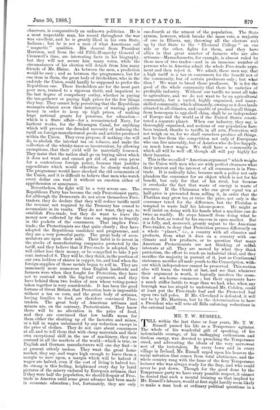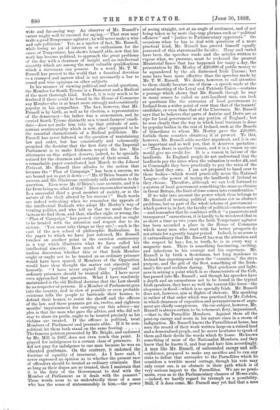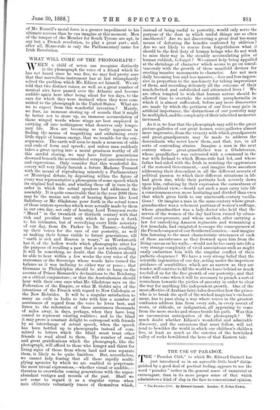MR. T. W. RUSSELL. T ILL within the last three or
four years, Mr. T. W. Russell passed his life as a Temperance agitator. The whole of his wonderful gift of speaking, of his indomitable courage, of his unflagging enthusiasm and tireless energy, was devoted to preaching the Temperance creed, and advocating the ideals of the very narrowest sect of the teetotalers. In every town and in every village in Ireland, Mr. Russell urged upon his hearers the social salvation that comes from total abstinence, and the whole country rang with the fame of the fiery Temperance lecturer who was always ready for the fray, and who could never be put down. Though for the good done by the Temperance party we have every possible respect, it cannot be denied that such a mental training as that implied by Mr. Russell's labours, would at first sight hardly seem likely to make a man look at ordinary political questions in a wide and far-seeing way. An observer of Mr. Russell's career might well be excused for saying,—' That man may make a good Temperance agitator ; he will never make a wise and safe politician.' Yet, as a matter of fact, Mr. Russell, while losing no jot of interest in or enthusiasm for the cause of Temperance, has shown himself able, now that his work has become political, to approach the great problems of the day with a clearness of insight and an intellectual sincerity which are among the most valuable qualifications which a statesman can possess. In a word, Mr. T. W. Russell has proved to the world that a fanatical devotion to a cramped and narrow ideal is not necessarily a bar to sound and wise opinions on other subjects. In his manner of viewing political and social questions, the Member for South Tyrone is a Democrat and a Radical -of the most thorough kind. Indeed, it is very much to be doubted if there could be found in the House of Commons any Member who is at heart more strongly and consistently popular in his sympathies. The fact, however, that Mr. Russell is by birth, as well as by election, a representative of the democracy—his father was a stonemason, and. he carried South Tyrone distinctly as a tenant-farmers' candi- date does not make him take up that attitude of anti- awmian sentimentality which is now, alas ! supposed to be the essential characteristic of a Radical politician. Mr. Russell has never faltered on the question of maintaining law and order, but has consistently and vehemently preached the doctrine that the first duty of the Imperial Parliament is to make Irishmen respect the law. His utterances on this subject deserve, indeed, to be specially noticed for the clearness and certainty of their sound. In a remarkable paper contributed last March to the Liberal Unionist, Mr. Russell thus alludes to the notion that because the "Plan of Campaign" has been a success, we are bound not to put it down :—" Mr. O'Brien boasts of its success, and Mr. Gladstone cautiously calls attention to the assertion. Even were Mr. O'Brien's case accurate, and it is far from being so, what of that ? Does success alter morals ? Is a successful thief a good member of society, or is the nature of the theft altered by his success ?" Such words are indeed refreshing when we remember the appeals of the intellectual Radicals who adopt Mr. Morley's way of treating politics, and who tell us that we must face the facts as we find them, and that, whether right or wrong, the "Plan of Campaign" has proved victorious, and so ought to be treated with the attention and respect due to its victory. You must take things as they are,'—such is the cant of the new school of philosophic Radicalism. In the paper to which we have just referred, Mr. Russell touches on another point in the coercion controversy in a way which illustrates what we have called his intellectual sincerity. How much of the confused and useless discussion whether this or that Irish Member ought or ought not to be treated as an ordinary prisoner would have been spared, if Members of the Opposition would have thus thought the matter out sincerely and honestly. "I have never argued that 'political' and ordinary prisoners should be treated alike. I have never even approached that question. What I have resolutely maintained is the old Radical doctrine that the Law should be no respecter of persons. If a Member of Parliament goes into the country, and in view of possible or even probable evictions tells the people to barricade their houses, to defend their homes, to resist the sheriff and the officers of the law, and these peasants get six, twelve, and eighteen months' imprisonment for carrying out this advice—my plea is that the man who gave the advice, and who did not stay to share its perils, ought to be treated precisely as his victims are treated. If the offence is political, treat Members of Parliament and peasants alike. If it be non- political, let them both stand on the same footing The famous petition presented by Mr. Bright, and endorsed by Mr. Mill in 1867, does not even touch this point. It prayed for indulgences to a certain class of prisoners. It did not pray for indulgence to one man because he was an educated gentleman. On the contrary, it endorsed the doctrine of equality of treatment. As I have said, I never expressed an opinion as to whether the present race of offenders should be treated as ordinary criminals. But so long as their dupes are so treated, then I maintain that it is the duty of the Government to deal with the Member of Parliament as it deals with the peasant." These words seem to us undoubtedly those of a man who has the sense of statesmanship in him,—the power of seeing straight, not at an angle of sentiment, and of not being taken in by mere clap-trap phrases such as "political offences" and "justice to Parliamentary opponents." On occasions when he has to deal with questions of a more practical End, Mr. Russell has proved himself equally possessed of this statesmanlike faculty. Many and varied have been the speeches made and the articles written to expose what, we presume, must be reckoned the greatest Ministerial fiasco that has happened for many a day, the presentation by Mr. Morley of £20,000 of public money to be squandered by the six distressed Irish Unions ; but none have been more effective than the speeches made by Mr. T. W. Russell. We desire, however, to call attention to them chiefly because one of them—a speech made at the annual meeting of the Loyal and Patriotic Union—contains a passage which shows that Mr. Russell, though he may in many senses be called an anti-landlord man, can look at questions like the extension of local government to Ireland from a wider point of view than that of the tenants' candidate, or even than that of the Ulstermen. Mr. Russell says that he believes that parts of Antrim and Down are as ripe for local government as any portion of England ; but he sees clearly that the way in which local business is done by popular bodies in the rest of Ireland, such as the Boards of Guardians to whom Mr. Morley gave the £20,000, forbids those counties obtaining it at present. To this, however, Mr. Russell adds another argument, and it is one so important and so well put, that it deserves quotation : —" Then there is another reason, and it is a reason no one would give me credit for. It is a reason in favour of the landlords. In England people do not understand that the landlords pay the rates when the valuation is under £4, and in Connaught they have practically to pay the rates of the whole land they own. I am not prepared to hand over to these bodies —which would practically mean the National League—the power of taxing the landlords of Ireland as they choose. Therefore, although we can look forward to a system of local government something the same as obtains in Great Britain, the limit of time comes into consideration."
If we take into account the power which thus belongs to Mr. Russell of treating political questions not as abstract problems, but as part of the whole scheme of government— which power is, in fact, the faculty of political common-sense —and remember that he combines with it "a passionate and transparent" earnestness, it is hardly to be wondered that in so short a time as two years the Irish Temperance agitator has been accorded a place in the House of Commons which many men who start with far better prospects do not attain for a greatly longer period. Indeed, in no sense is it extraordinary that Mr. Russell has won the attention and the respect he has ; for, in truth, he is in every way a magnetic man. There is something fascinating, exciting, and infectious in his courage and his eagerness. Mr. Russell is by birth a Scotchman, but long residence in Ireland has superimposed upon the "canniness," the stern purpose, and the grit of the Scot, something of the Irish- man's fire and reckless daring. That quickness and light- ness in seizing a point which is so characteristic of the Celt, has passed into Mr. Russell ; and though his speeches have a depth and an earnestness not to be found in the typical Irish speakers, they have as well the torrent-like force—the eloquence in flood—which is so specially Irish. Mr. Russell does not, however, aim at flights of rhetoric. His speaking is rather of that order which was practised by Mr. Cobden, in which clearness of exposition and persuasiveness of argu- ment are chiefly conspicuous. On one subject, however, Mr. Russell is always certain to be vehement, fiery, impassioned, —that is, the Parnellite Members. Against them all the pent-up energy and scorn in his nature rises in a storm of indignation. Mr. Russell knows the Parnellites at home, has seen the record of their work written large on a ruined land and a demoralised people, and he never hesitates to speak of them and their deeds the words which fly home. He knows something of most of the Nationalist Members, and they know that he knows it, and fear and hate him accordingly. A man like Mr. Russell, of unbounded energy and self- confidence, prepared to make any sacrifice and to run any risks to defeat that surrender to the Parnellites which he considers a terrible moral outrage, though his vote may only count one, is an obstacle in their path which is of very serious import to the Parnellites. We are no pessi- mists, even as to the Parliamentary chances of Home-rule, —indeed, we hardly regard its triumph as a possibility. Still, if it does come, Mr. Parnell may yet find that a man of Mr. Russell's moral force is a greater impediment to his ultimate success than he can imagine at this moment. Men of the temper of the Member for South Tyrone are apt, in any but a French revolution, to play a great part ; and, after all, Home-rule is only the Parliamentary name for Irish Revolution.




















































 Previous page
Previous page